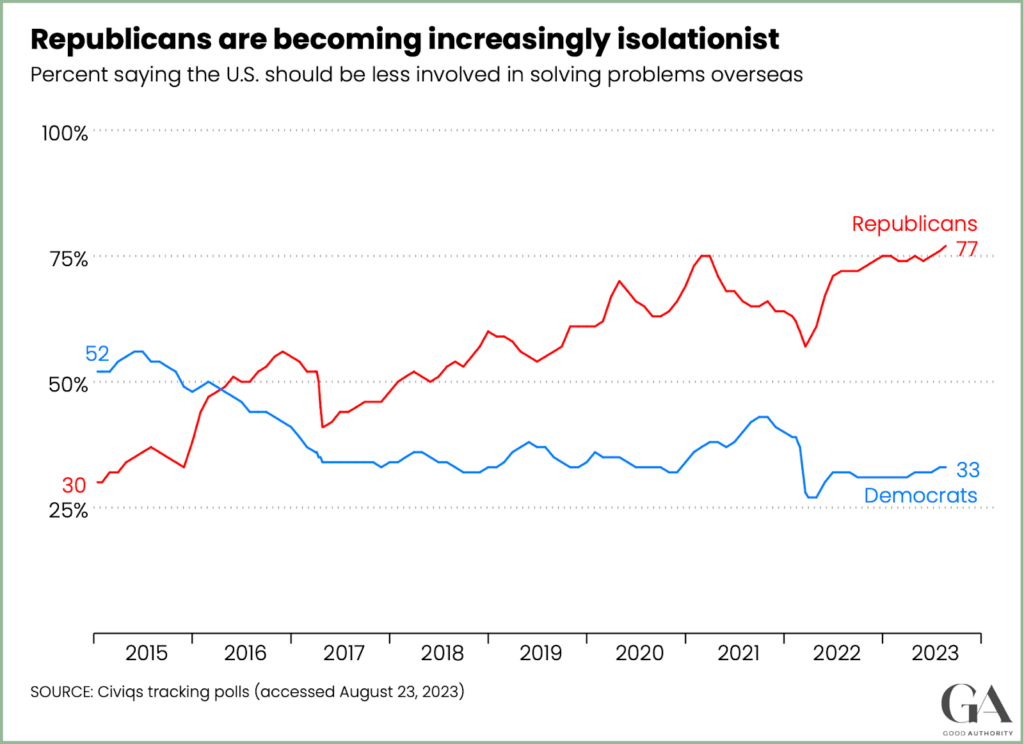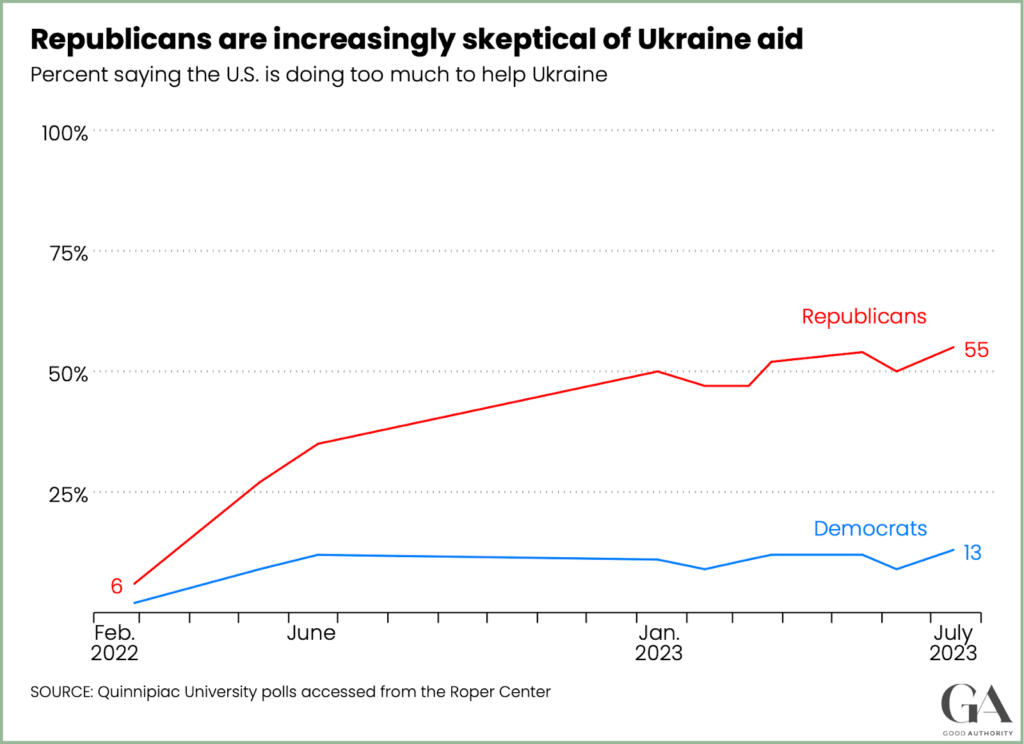Among the candidates for the Republican presidential nomination, who would not support sending Ukraine another $24 billion in aid? When the Fox News moderator asked candidates at the first debate, two of the eight candidates – Ron DeSantis and Vivek Ramaswamy – raised their hands.
In doing so, DeSantis and Ramaswamy did more than just separate themselves from their Republican rivals on the issue of economic and military support to Ukraine. They also bucked the GOP internationalist foreign policy orthodoxy that had dominated from Dwight Eisenhower’s presidency up until Donald Trump’s.
Many prominent Republicans – including Sen. Lindsey Graham, Sen. Marco Rubio, Sen. Mitt Romney, former U.S. national security advisor John Bolton, Senate Minority Leader Mitch McConnell, and most of the 2024 Republican presidential candidates – still strongly advocate for the U.S. to take an active leadership role in foreign relations and international organizations.
Republican voters are becoming isolationists …
But these establishment Republicans are increasingly out of step with the remarkable rise in isolationist sentiments among their party’s voters. Take this chart, for example.

Drawing on data from the Civiqs Daily Tracking polling of over 300,000 registered voters since 2015, the display shows that the share of Republicans saying that the U.S. should be less involved in solving problems overseas has more than doubled. Back then, just 30 percent of Republicans wanted the U.S. to be less actively engaged overseas. But isolationist GOP voters quickly grew to a solid 55-percent majority by Election Day 2016. That has steadily increased – all the way up to a 77-percent super-majority of Republican voters today.
… while Democratic voters are becoming internationalists …
Democrats’ foreign policy views, meanwhile, have moved in the opposite direction. At the start of 2016, most Democratic voters still said that the U.S. should be less involved in solving problems overseas. But that isolationist majority eroded during the 2016 presidential campaign and has plummeted even further in recent years – down to about one-third of Democrats throughout the past 18 months since Russia’s February 2022 invasion of Ukraine.
… and opinion on Ukraine has polarized by party
As a result, public opinion about aiding Ukraine’s efforts against the Russian invasion is also now sharply polarized. Republicans increasingly oppose military and cash appropriations, while Democrats support both. Right after the war began, there was a brief period of bipartisan support for helping Ukrainians. If anything, Republicans were even more hawkish than Democrats during those early days of the conflict. In a Feb 26 – March 1, 2022, Economist-YouGov Poll, for instance, a significantly larger share of Republicans than Democrats said that the U.S. government’s response to Russia’s invasion of Ukraine should be tougher, at 60 percent to 46 percent respectively. And in late February 2022, a Quinnipiac University poll found, similarly, that 61 percent of Republicans thought the U.S. was not doing enough to help Ukraine against Russia, compared to just 38 percent of Democrats.
But the chart below shows that Republicans’ initially strong support for Ukraine has steadily been subsumed by the stronger strains of isolationism within the party. Or more simply put, Republicans turned against helping Ukraine after Donald Trump and his allies began criticizing congressional spending packages for the besieged country in the spring of 2022.

Indeed, you can see in the display that the share of Republicans in Quinnipiac University polls who said the U.S. is doing “too much to help Ukraine” has grown from 6 percent in February 2022 to 35 percent in June 2022 – and all the way up to 55 percent in July 2023. Only about 10 percent of Democrats, by contrast, have said that we are providing too much aid to Ukraine in Quinnipiac Polls conducted over the past year-and-a-half. There was equally large partisan divide in an August 26-29, 2023, YouGov-Economist Poll, too, which found that 54 percent of Trump voters and just 8 percent of Biden voters wanted to decrease military aid to Ukraine.
The Donald Trump effect
These opinion shifts on foreign policy in general and on Ukraine aid in particular are dramatic, to be sure. But they are not exactly surprising. After all, Democratic and Republican voters’ realignment over the U.S.’s involvement in solving problems overseas coincides with a sustained focus on Donald Trump’s isolationist foreign policy positions during the past eight years. Political science research has long shown that partisan messages have a big influence on public opinion. When each party’s leaders take opposing positions on issues, the public usually follows their lead – especially on complex issues that people have little direct knowledge about, like foreign policy. Americans, in fact, have often changed their opinions of foreign policies – from World War II to Iraq – based on their views of the president who is guiding it.
Of course, Donald Trump isn’t just any president (or presidential candidate). He inspired an unprecedented level of partisan polarization throughout his term in office. As a result of that adulation from the right and animosity from left, Pres. Trump’s positions increasingly polarized public opinion about several issues, including covid-19, sexual harassment, race and policing, immigration, Islam, trade, and foreign policy. Trump even managed to redefine traditional ideological labels, as I showed in an earlier piece for FiveThirtyEight, with conservatism becoming increasingly synonymous with Trumpism in the minds of GOP voters.
This ideological transformation of the Republican Party means that its members no longer need to espouse the same type of interventionist foreign policies as Presidents Nixon, Reagan, and Bush to be considered conservatives in good standing. Instead, Trump’s rise to political prominence appears to have turned the clock back to the 1930s for most GOP voters – a time when conservative Republicans’ foreign policy positions were characterized by “America First” isolationism.
Image: (cc) Gage Skidmore, via Flickr



